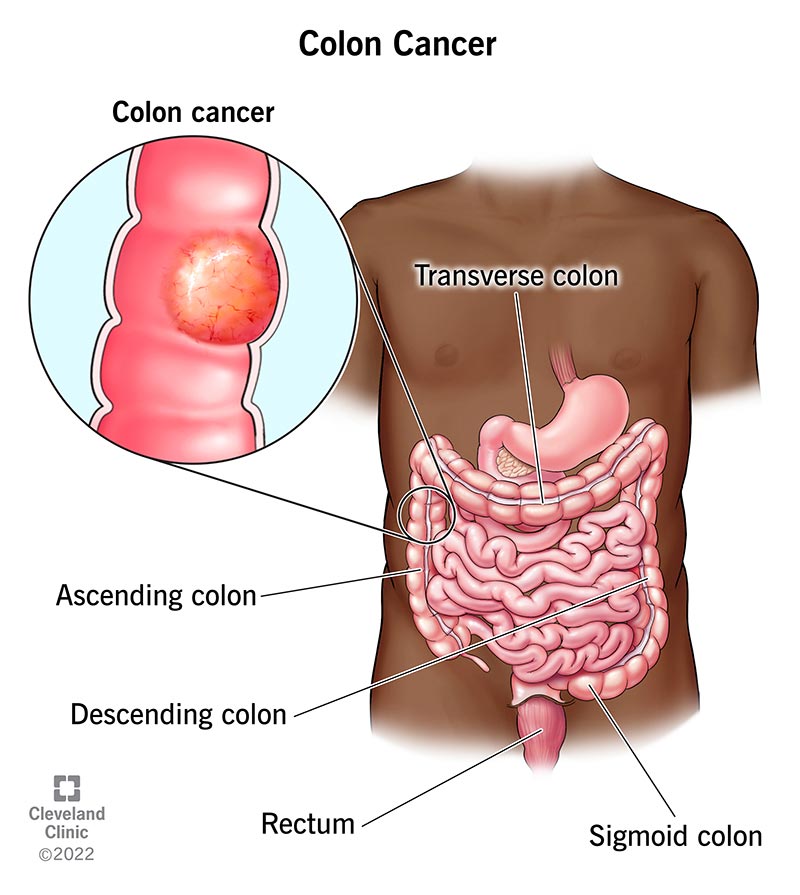Introduction:
Welcome to our Colon Cancer Awareness platform, dedicated to providing comprehensive information, resources, and support for individuals impacted by colon cancer. Colon cancer, also known as colorectal cancer, is a significant health concern worldwide. Through education, early detection, and support, we aim to empower individuals to take control of their colon health and reduce the impact of this disease.
Understanding Colon Cancer:
- Overview: Provide an in-depth explanation of colon cancer, highlighting its prevalence, types (e.g., adenocarcinoma, carcinoid tumors), and stages.
- Causes and Risk Factors: Explore the various factors contributing to colon cancer development, including age, family history, genetic mutations (e.g., Lynch syndrome), diet high in red or processed meats, sedentary lifestyle, and inflammatory bowel diseases (e.g., Crohn’s disease, ulcerative colitis).
- Pathophysiology: Explain the process by which normal colon cells transform into cancerous cells, detailing the role of genetic mutations, tumor suppressor genes, and oncogenes.

Signs, Symptoms, and Diagnosis:
- Common Signs and Symptoms: Describe the signs and symptoms of colon cancer, such as changes in bowel habits, blood in the stool, abdominal discomfort, unintended weight loss, and fatigue.
- Diagnostic Procedures: Discuss the various diagnostic tests used to detect colon cancer, including colonoscopy, sigmoidoscopy, fecal occult blood test (FOBT), fecal immunochemical test (FIT), and imaging studies (e.g., CT scan, MRI).
Prevention and Screening:
- Screening Guidelines: Provide recommendations for colon cancer screening based on age, family history, and risk factors, including colonoscopy, stool-based tests, and virtual colonoscopy (CT colonography).
- Lifestyle Modifications: Offer guidance on lifestyle changes to reduce the risk of colon cancer, such as maintaining a healthy weight, exercising regularly, quitting smoking, and consuming a diet rich in fruits, vegetables, and fiber.
- Genetic Counseling: Highlight the importance of genetic counseling and testing for individuals with a family history of colon cancer or inherited genetic mutations predisposing them to the disease.
Treatment Options:
- Surgery: Explain surgical interventions for colon cancer, including colectomy (partial or total removal of the colon), lymph node dissection, and minimally invasive procedures (e.g., laparoscopic surgery, robotic-assisted surgery).
- Chemotherapy: Discuss the role of chemotherapy in treating colon cancer, either as adjuvant therapy following surgery to kill any remaining cancer cells or as palliative treatment for advanced disease.
- Radiation Therapy: Describe how radiation therapy may be used in combination with surgery and/or chemotherapy to target and shrink tumors, particularly in rectal cancer cases.
Living with Colon Cancer:
- Coping Strategies: Offer practical tips and strategies for managing the physical, emotional, and psychological challenges associated with a colon cancer diagnosis and treatment.
- Nutritional Guidance: Provide dietary recommendations to support individuals during and after colon cancer treatment, focusing on maintaining adequate nutrition, managing side effects, and optimizing overall health.
- Support Services: Connect patients, survivors, and caregivers with support groups, counseling services, and resources to help navigate the colon cancer journey and promote well-being.
Research and Innovation:
- Clinical Trials: Inform readers about ongoing clinical trials and research studies investigating new treatment approaches, targeted therapies, and immunotherapies for colon cancer.
- Advances in Treatment: Highlight recent advancements in colon cancer treatment, including emerging therapies, molecular profiling, and personalized medicine approaches.
Conclusion:
At our Colon Cancer Awareness platform, we are committed to raising awareness, promoting early detection, and providing support to individuals affected by colon cancer. By understanding the risk factors, signs, symptoms, and available treatment options, individuals can take proactive steps to protect their colon health and improve outcomes. Together, we can make a difference in the fight against colon cancer and support those on their journey to recovery and resilience. Join us in spreading awareness and empowering individuals to prioritize their colon health.
